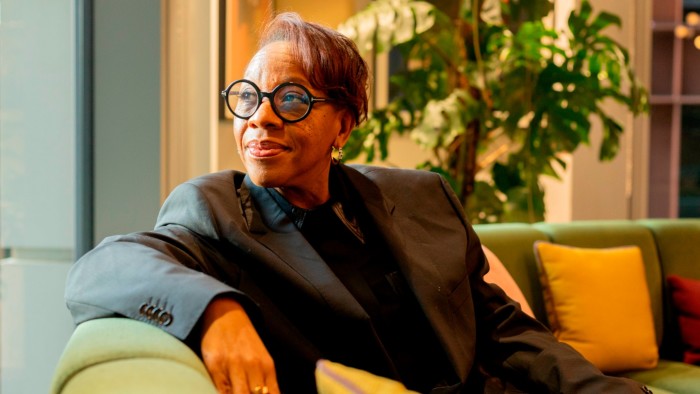Summarize this content to 2000 words in 6 paragraphs in Arabic How, as an actor, do you get into the head of a difficult character? And how, once you’re in there, do you handle the discomfort of playing someone racked with fear, anguish and rage? What can it feel like playing someone like Pansy, the protagonist of Mike Leigh’s new film Hard Truths? “She’s not easy,” says Marianne Jean-Baptiste with a throaty laugh, as if relieved to have left the character behind. “That fear, that anxiety, constantly being on the alert for danger, for a threat — it’s very taxing.”Pansy is a London woman bitterly frustrated with her life, a catastrophist able to convert the minor annoyances of an ordinary day into something on a level with the 10 plagues. Jean-Baptiste brings her to life more than vividly in a mesmerising performance, matching force-10 intensity — as Pansy launches into her caustic jeremiads against the world — with the most delicate psychological nuance.In 1996, Jean-Baptiste captured the world’s attention as a much more empathetic character: Hortense Cumberbatch, a London optometrist searching for her birth family in Leigh’s Palme d’Or-winning Secrets & Lies. With that film, she became the first Black British woman to be nominated for an Oscar. Her reunion with the director nearly 30 years on is no less a triumph: she has been nominated for Best Leading Actress at the Baftas, after already winning Best Lead Performance in the British Independent Film Awards, with similar wins in assorted North American film critics’ prizes.Sitting in a London hotel, wearing round thick-rimmed professorial glasses and a crisp asymmetrical haircut, Jean-Baptiste explains how she and the other members of a predominantly Black cast — including her Secrets & Lies co-star Michele Austin — created their roles in Hard Truths. As fits the famously distinctive Leigh method, they started with a blank slate, characters and narrative emerging through a collaborative process that begins with actors contributing elements of people they have known.Pansy, says Jean-Baptiste, is “pieces of people, little bits. You take gentleness away from some person, and then you give them a resentment from something that happened, and then you create some disappointments for them . . . You chip away and you add and you think, until it becomes a totally different person.”The method involves knowing everything about a character’s life, right back to childhood: “First memory, who lived across the street, what school they went to, what was the bus route.” Her preparation also involved walking around and seeing the world through Pansy’s eyes. “You monitor the character. Mike would never say, ‘Go out as Pansy in character’ — that would be quite dangerous, actually — but just sort of, ‘Gently go into character and just observe as she would observe, and feel.” That’s where you start to go, ‘OK — doesn’t like pigeons, doesn’t like going under bridges because of bird shit.’ The this and the that . . . And so you start sort of collecting, building.”The richly detailed realism of Hard Truths also emerges from the shared experiences of its predominantly Black cast — from the culture of hair salons to specific but fleeting Caribbean inflections in the dialogue and delivery. “Everybody’s grown up with the same sorts of things — what’s happening on Sunday for dinner, who would be bringing this, who would be cooking that, and who always turns up late . . . Somebody second-generation — brought up in London, Jamaican mother — would know how to do patois, but wouldn’t speak like that necessarily all the time. It would just be flipping in and out when you felt like it.”It’s one of the few films that you see with a modern Black family where they’re not reacting to racismAs for the specific reasons why Pansy experiences life as she does, it seems there is a veil of omertà involved in the Leigh method. “It’s a thing that we don’t really talk about — the back-story and stuff.” But Jean-Baptiste quashes my speculative suggestion that Pansy’s malaise might stem partly from an experience of racism — not that it is ever alluded to in the film. “We almost deliberately do not react to racism in the film — it’s one of the few films that you see with a modern Black family where they’re not reacting to racism. There isn’t a miscarriage of justice — it’s just people living and being human.”Raised in Peckham, Jean-Baptiste, 57, still has an unchanged London accent and intonations, despite spending the last 23 years in Los Angeles, where she lives with her husband, physical therapist and former ballet dancer Evan Williams, and two daughters in their twenties. She studied at the Royal Academy of Dramatic Art, then first worked with Leigh in 1993, when he cast her in his stage play It’s A Great Big Shame. Three years later, she played Hortense, then — an accomplished musician — wrote the score for Leigh’s film Career Girls (1997). Since then, Jean-Baptiste has enjoyed a very successful career in the US, although the work has not always offered the same exploratory opportunities as a Leigh project. She has chalked up a gallery of authority figures (a police chief here, a forbidding boffin there) and appeared in 159 episodes of procedural series Without a Trace, as FBI missing persons investigator Vivian Johnson.What is it like living with a single character for so long? “The first couple of years were really hard,” she admits. “It was like: what the hell? Then you kind of hit a level — ‘OK, how do you make this interesting? How do you find something new in it?’ I kept giving myself acting exercises.”Adept as she is at making the most of mainstream projects, she admits, “I prefer the stuff that’s out on the margins.” Probably furthest out in her CV is In Fabric, the 2018 film by defiantly left-field British writer-director Peter Strickland, in which she plays a woman who falls prey to the malign effects of her own red dress. On the whole, the UK has offered the juiciest challenges, including TV roles — notably her 1999 performance as Doreen Lawrence in The Murder of Stephen Lawrence, directed by Paul Greengrass. She was a ferocious barrister in Broadchurch and, more recently, a fantasy novelist targeted by a predatory conman in BBC series The Following Events Are Based on a Pack of Lies, in which role she combined vulnerability and hauteur.She has also done adventurous stage work, notably with Peter Brook in Paris, and at the Royal Court in hang by debbie tucker green: “She’s one of the best writers. Her dialogue — no one does it like that. It’s like jazz music.”Jean-Baptiste says she avoids too much politics: “I’m like, head in the sand, man. I don’t watch all the stuff, because you can get infuriated by it.” But, as a US resident she is fervently hoping for an end to the Trump era and its culture of rage, perhaps informed by having lived in the head of someone like Pansy. “You kind of think, ‘Aren’t you tired of feeling like this?’ Because it is exhausting — the screaming, the hate. I’m tired of the hate.”‘Hard Truths’ is in UK cinemas from January 31 and in US cinemas now
رائح الآن
rewrite this title in Arabic Bafta-nominated actor Marianne Jean-Baptiste: ‘I prefer the roles out on the margins’
مال واعمال
مواضيع رائجة
النشرة البريدية
اشترك للحصول على اخر الأخبار لحظة بلحظة الى بريدك الإلكتروني.
© 2026 جلوب تايم لاين. جميع الحقوق محفوظة.









